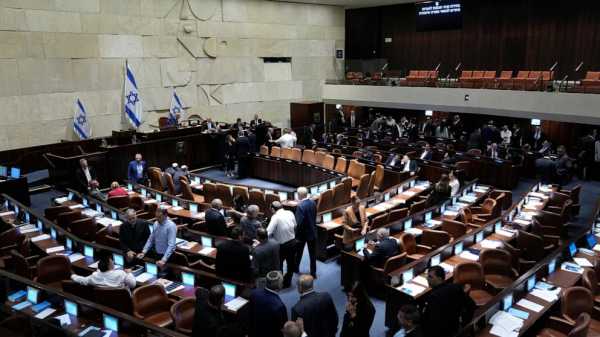
JERUSALEM — Israel’s parliament on Wednesday appointed an opposition lawmaker to the powerful committee that picks the country’s judges, defying Prime Minister Benjamin Netanyahu in a vote that exposed divisions within the ruling coalition and raised questions about his control over his political allies.
The vote appeared to temporarily avert a crisis that had threatened to unleash renewed political turmoil over Netanyahu's contentious judicial overhaul plan.
The opposition had threatened to withdraw from negotiations with Netanyahu over the overhaul if its candidate, Karine Elharrar, was not named to the committee. Despite Elharrar's appointment on Wednesday, the opposition said it would nonetheless suspend talks with Netanyahu until the second vacancy on the committee is filled and it can resume work.
“No committee, no talks,” opposition leader Yair Lapid said.
Netanyahu accused his opponents of trying “to blow up the dialogue.”
Netanyahu’s government unveiled the judicial overhaul days after taking office last December, saying the plan was needed to rein in an interventionist judiciary. Netanyahu’s opponents say the plan is a way for the far-right coalition — a collection of ultranationalist and ultra-Orthodox parties — to gain control over the judicial system, threatening the country’s system of checks and balances.
The proposal has prompted hundreds of thousands of Israelis to take part in mass demonstrations each week against the proposed overhaul. The demonstration prompted Netanyahu to freeze the plan in March and open negotiations, brokered by the country’s figurehead president, aimed at reaching a compromise with his opponents.
The committee for appointing judges — which, among other things, approves the makeup of the Supreme Court — has been a central battleground in the overhaul plan.
Both the governing coalition and the opposition traditionally are represented on the nine-member committee. But proponents of the overhaul had demanded that the coalition control both positions, drawing accusations that Netanyahu and his allies were trying to stack the judiciary with cronies.
The votes, cast anonymously, raised doubts about Netanyahu's control over his coalition.
Netanyahu ordered his allies to oppose all candidates, including its own members, in a maneuver that he hoped would delay all appointments until another vote a month from now.
But in the secret ballot, several coalition members joined the opposition in supporting Elharrar's appointment in a 58-56 vote. A second candidate, Tally Gotliv of Netanyahu's Likud party, mustered just 15 votes and did not clear the threshold. That means parliament will have to fill the post in the coming month.
Lapid said it was “good news” that an opposition member would remain on the judicial selection committee. But he said was problematic that there is still no committee.
“Netanyahu today prevented its establishment, putting an end to the pretense that he was open to negotiations,” he said.
“Netanyahu used to be a liar and powerful. Now he is a liar and weak,” he said. “The committee was not established, the threat to democracy is not removed.”
In a video statement, Netanyahu said his opponents were to blame, noting that they froze the talks even after getting what they wanted.
“Gantz and Lapid don’t want real negotiations," he said. "I promise the citizens of Israel, unlike them, we will act responsibly for our country.”
Since the overhaul was paused in March, the weekly protests have continued to draw tens of thousands of people. The protesters are set to demonstrate for a 24th week on Saturday.
Anticipating protests over the vote on Wednesday, police set up barriers outside the parliament building and next to Netanyahu's home in central Jerusalem. But the protests were called off after the opposition lawmaker's appointment.
___
Associated Press writer Laurie Kellman in Tel Aviv, Israel, contributed reporting.
Sourse: abcnews.go.com






